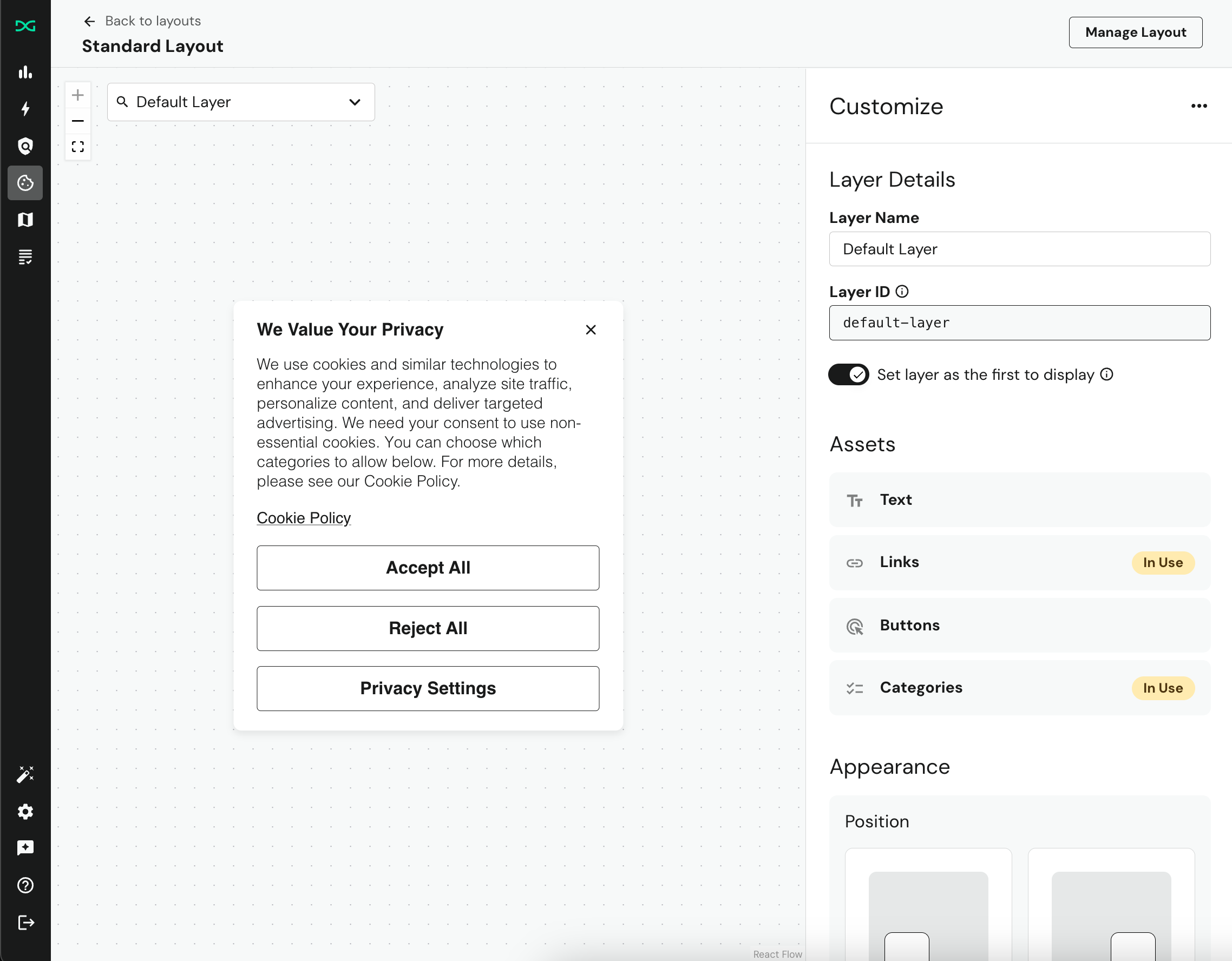Overview
DataGrail Consent is a Consent Management Platform (CMP) solution that simplifies and automates compliance with cookie and tracking script opt-in/opt-out. Your privacy and marketing team will use Consent to:
- Automatically display different consent options and banner copy depending on the user’s region and corresponding regulation
- Update policies and copy without any developer intervention required
- Identify scripts and cookies that may pose a compliance risk and audit new scripts to determine whether they are exempt from consent opt-out
- Fully customize your consent banner to match your brand
Check Out Our Consent Video Training Series!
Consent Management Roles
The following User Roles have access to the Consent Management product:
- Super Admin: This role can perform all actions within the Consent Management product, including downloading Consent Audits.
- Consent Management Admin: This role can perform all actions within the Consent Management product, including downloading Consent Audits. To connect Google Tag Manager and other Consent Integrations, the Connections Manager Role is required.
- Consent Management Edit: This roll has all Consent Management Read capabilities and can additionally manage containers, policies, banner layouts, tracking services, and publishing.
- Consent Management Read: This role can view all Consent Management areas.
Consent Features
DataGrail Consent provide the following capabilities to centralize banner management, enforce regional rules, and monitor new tracking activity.
No Code Implementation
Google Tag Manager (GTM) is a tag management system that manages the execution of tags, which are snippets of code that execute based on events that occur while your experience runs for end users. Over 90% of businesses have Google Tag Manager installed on their websites to offer personalized marketing experiences to their customers.
DataGrail Consent offers a turnkey, foundational integration to Google Tag Manager that makes it easy to rapidly deploy a CMP within minutes. DataGrail both manages tag execution based on consent preferences and publishes the banner to your website via your existing GTM integration. Your GTM admin simply needs to sign in with their Google account, and DataGrail takes care of the rest.
DataGrail supports Google Consent Mode which lets Google-owned tags (e.g., Analytics, Ads) adapt their behavior to the consent signals from DataGrail Consent. In the case a user denies all tracking services, Google owned services can continue to fire, sending only limited, cookieless, anonymized pings.
Global Compliance
DataGrail allows you to define Consent Policies, which enable granular control of consent behavior by region. The following behaviors can be adjusted by policy (region):
- Initial tracking behavior
- Opt-Out signal handling
- Honoring Do Not Track and Global Privacy Control signals
- Banner visibility
- Banner appearance
- US Privacy String Support
Robust Consent Banner Builder
DataGrail's Layouts feature enables you to adjust the copy and appearance of your banner without writing any code.
Layouts support custom buttons, links, as well as seamless translations to support your Consent Management needs across the globe.

DataGrail offers an extensive library of CSS selectors to ensure the look and feel of the banner matches your brand.
New Tracking Service Alerts
DataGrail provides automated alerting for new scripts and trackers identified through the following methods:
- Scripts/tags added to Google Tag Manager are continuously synced to DataGrail
- DataGrail's Cookie Scanner detects newly set first-party Cookies
Flexible Options For Your Stack
Not using Google Tag Manager? No problem! DataGrail's Embedded Deployment method allows you to deploy consent using an inline script.
Tracking services deployed outside of Google Tag Manager can be managed using the following methods:
- Inline Script Management: DataGrail supports managing scripts deployed inline through the ScriptControl plugin.
- Callback Functions: DataGrail Consent can manage both a data subject's online tracking preferences as well as tracking that occurs in-app or via other marketing automation platforms and solutions like Segment or HubSpot through callback functions.
- Cookie Management: You can use DataGrail Consent to manage first-party cookies that store data subject data within the browser, which can be necessary for your company to comply with various industry regulations.
DataGrail additionally supports sharing consent preferences across all subdomains where Consent is deployed.
Deployment Paths
In order to host the banner and manage your scripts and cookies, DataGrail needs to deploy a small piece of JavaScript on your site (consent.js). We provide two options to create a container and deploy this code.
Choose and configure the deployment option for all sites you wish to manage in DataGrail. You may find some sites are better suited to different deployment options.
| Deployment Option | Description | Best For | Prerequisites |
|---|---|---|---|
| Google Tag Manager (Recommended) | Use the Google Tag Manager (GTM) Integration to automatically deploy consent.js and sync/manage your GTM tags. | Most websites. This is the simplest, no-code deployment path. | Google Tag Manager on site. |
| Embedded Deployment | Create a custom container and place the provided JavaScript in the <head> of your site. Once configured, subsequent updates are published automatically through DataGrail. | Complex websites that require more control over when DataGrail is executed on the page. | None |
Implementing a Consent Management Solution is a major change on your website. Consent interacts with your other third-party scripts and cookies, so we always recommend configuring and testing DataGrail on a staging site before doing so on your production one. If you do not have a staging site, ensure you read the Test Mode Documentation.
Further Reading
To better understand consent management within and beyond DataGrail, we recommend these resources:
- Guide to Consent Management Platforms (CMPs): Learn more about how CMPs work broadly and their importance.
- Lawyers Warn of Wave of Consumer Lawsuits: Recognize the stakes of failing to honor consumer privacy opt-outs, especially for tracking scripts.
- 2024 Data Privacy Trends (Webinar): Uncover new stats on how well websites honor consumer tracking opt-outs and much more.
Disclaimer: The information contained in this message does not constitute as legal advice. We would advise seeking professional counsel before acting on or interpreting any material.